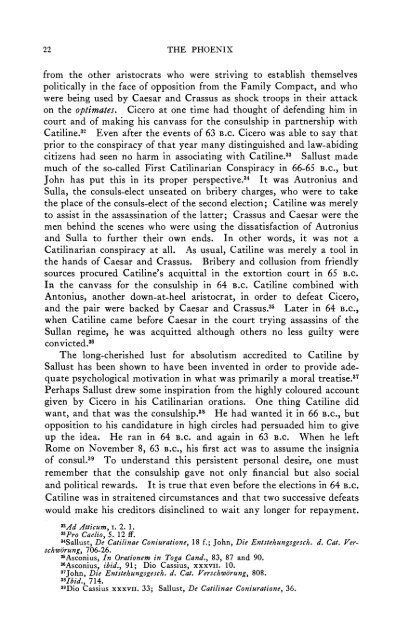Catiline and the "Concordia Ordinum" - Historia Antigua
Catiline and the "Concordia Ordinum" - Historia Antigua
Catiline and the "Concordia Ordinum" - Historia Antigua
Create successful ePaper yourself
Turn your PDF publications into a flip-book with our unique Google optimized e-Paper software.
22 THE PHOENIX<br />
from <strong>the</strong> o<strong>the</strong>r aristocrats who were striving to establish <strong>the</strong>mselves<br />
politically in <strong>the</strong> face of opposition from <strong>the</strong> Family Compact, <strong>and</strong> who<br />
were being used by Caesar <strong>and</strong> Crassus as shock troops in <strong>the</strong>ir attack<br />
on <strong>the</strong> optimates. Cicero at one time had thought of defending him in<br />
court <strong>and</strong> of making his canvass for <strong>the</strong> consulship in partnership with<br />
<strong>Catiline</strong>.32 Even after <strong>the</strong> events of 63 B.C. Cicero was able to say that<br />
prior to <strong>the</strong> conspiracy of that year many distinguished <strong>and</strong> law-abiding<br />
citizens had seen no harm in associating with <strong>Catiline</strong>.33 Sallust made<br />
much of <strong>the</strong> so-called First Catilinarian Conspiracy in 66-65 B.C., but<br />
John has put this in its proper perspective.34 It was Autronius <strong>and</strong><br />
Sulla, <strong>the</strong> consuls-elect unseated on bribery charges, who were to take<br />
<strong>the</strong> place of <strong>the</strong> consuls-elect of <strong>the</strong> second election; <strong>Catiline</strong> was merely<br />
to assist in <strong>the</strong> assassination of <strong>the</strong> latter; Crassus <strong>and</strong> Caesar were <strong>the</strong><br />
men behind <strong>the</strong> scenes who were using <strong>the</strong> dissatisfaction of Autronius<br />
<strong>and</strong> Sulla to fur<strong>the</strong>r <strong>the</strong>ir own ends. In o<strong>the</strong>r words, it was not a<br />
Catilinarian conspiracy at all. As usual, <strong>Catiline</strong> was merely a tool in<br />
<strong>the</strong> h<strong>and</strong>s of Caesar <strong>and</strong> Crassus. Bribery <strong>and</strong> collusion from friendly<br />
sources procured <strong>Catiline</strong>'s acquittal in <strong>the</strong> extortion court in 65 B.C.<br />
In <strong>the</strong> canvass for <strong>the</strong> consulship in 64 B.c. <strong>Catiline</strong> combined with<br />
Antonius, ano<strong>the</strong>r down-at-heel aristocrat, in order to defeat Cicero,<br />
<strong>and</strong> <strong>the</strong> pair were backed by Caesar <strong>and</strong> Crassus.35 Later in 64 B.c.,<br />
when <strong>Catiline</strong> came before Caesar in <strong>the</strong> court trying assassins of <strong>the</strong><br />
Sullan regime, he was acquitted although o<strong>the</strong>rs no less guilty were<br />
convicted.36<br />
The long-cherished lust for absolutism accredited to <strong>Catiline</strong> by<br />
Sallust has been shown to have been invented in order to provide adequate<br />
psychological motivation in what was primarily a moral treatise.37<br />
Perhaps Sallust drew some inspiration from <strong>the</strong> highly coloured account<br />
given by Cicero in his Catilinarian orations. One thing <strong>Catiline</strong> did<br />
want, <strong>and</strong> that was <strong>the</strong> consulship.38 He had wanted it in 66 B.C., but<br />
opposition to his c<strong>and</strong>idature in high circles had persuaded him to give<br />
up <strong>the</strong> idea. He ran in 64 B.C. <strong>and</strong> again in 63 B.C. When he left<br />
Rome on November 8, 63 B.c., his first act was to assume <strong>the</strong> insignia<br />
of consul.39 To underst<strong>and</strong> this persistent personal desire, one must<br />
remember that <strong>the</strong> consulship gave not only financial but also social<br />
<strong>and</strong> political rewards. It is true that even before <strong>the</strong> elections in 64 B.C.<br />
<strong>Catiline</strong> was in straitened circumstances <strong>and</strong> that two successive defeats<br />
would make his creditors disinclined to wait any longer for repayment.<br />
32Ad Atticum, I. 2. 1.<br />
33Pro Caelio, 5. 12 ff.<br />
34Sallust, De Catilinae Coniuratione, 18 f.; John, Die Entstehungsgesch. d. Cat. Verschw6rung,<br />
706-26.<br />
uAsconius, In Orationem in Toga C<strong>and</strong>., 83, 87 <strong>and</strong> 90.<br />
36Asconius, ibid., 91; Dio Cassius, xxxvii. 10.<br />
37John, Die Entstehungsgesch. d. Cat. Verschwbrung, 808.<br />
38Ibid., 714.<br />
39Dio Cassius xxxvin. 33; Sallust, De Catilinae Coniuratione, 36.

















